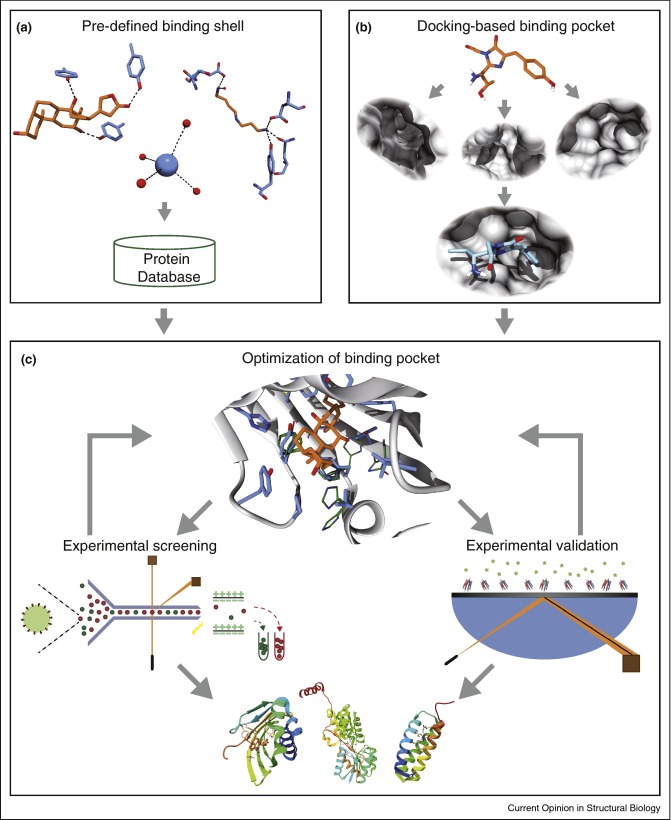EnzymoGenius™ specializes in computational design, revolutionizing the field of enzyme engineering by providing a sophisticated platform for the tailored modification of enzyme binding pockets. Our service employs state-of-the-art techniques to enhance ligand binding, facilitating superior enzyme performance in various applications.
Overview
Computational design of enzyme binding pockets for ligands represents a cutting-edge approach in drug discovery, leveraging advanced algorithms and molecular modeling techniques. This innovative methodology aims to predict and optimize the interactions between enzymes and ligands, facilitating the development of novel therapeutic agents. Through the integration of structural bioinformatics, molecular dynamics simulations, and machine learning, researchers have made significant strides in accurately predicting ligand binding affinities and optimizing binding pocket configurations. The progress in this field has been marked by the refinement of algorithms, increased computational efficiency, and the validation of predictions through experimental assays. These advancements hold great promise for accelerating drug discovery processes by enabling the rational design of enzyme-ligand interactions, ultimately contributing to the development of more potent and selective pharmaceuticals.
 Fig. 1 Scheme of the two commonly used approaches of computational ligand-binding protein design. (Yang W, et al., 2017)
Fig. 1 Scheme of the two commonly used approaches of computational ligand-binding protein design. (Yang W, et al., 2017)
Our Services
- Virtual Screening
Utilizing molecular docking simulations to identify potential ligands that exhibit optimal binding affinity within the designed enzyme pocket.
- Quantitative Structure-Activity Relationship (QSAR) Analysis
Employing computational models to predict the impact of structural modifications on ligand-enzyme interactions, guiding rational enzyme engineering.
- Molecular Dynamics Simulations
Analyzing the dynamic behavior of enzyme-ligand complexes over time, offering insights into stability and conformational changes crucial for functional optimization.
- Binding Energy Calculations
Quantifying the strength of enzyme-ligand interactions to prioritize and select the most promising candidates for experimental validation.
Application Areas We Can Serve
- Drug Discovery
Tailoring enzyme binding pockets for pharmaceutical targets to optimize drug candidate interactions.
- Biocatalysis
Enhancing enzyme catalytic efficiency for industrial processes, ranging from biofuel production to bioremediation.
- Agrochemicals
Designing enzymes for improved efficacy in the development of environmentally friendly pesticides and fertilizers.
- Biomedical Research
Facilitating the study of enzyme functions in cellular processes and disease pathways through targeted modifications.
Our Technical Advantages
- Precision Engineering
Our advanced algorithms enable precise modification of enzyme binding pockets, ensuring targeted enhancements in ligand affinity and catalytic efficiency.
- Scalability
EnzymoGenius™ is designed to accommodate a diverse range of enzymes, offering a scalable solution for various applications in enzyme engineering.
- Validation Accuracy
Rigorous validation protocols ensure the reliability of our computational predictions, providing researchers with trustworthy insights for experimental design.
EnzymoGenius™ stands at the forefront of computational enzyme design, offering a comprehensive suite of services to drive innovation in diverse fields. Our precision engineering capabilities, coupled with rigorous validation and scalability, position us as the go-to solution for researchers and industry professionals seeking to optimize enzyme-ligand interactions. Explore the limitless possibilities of enzyme engineering with EnzymoGenius™—contact us to unlock the full potential of your research and accelerate your journey towards groundbreaking discoveries.
Reference
- Yang, W.; Lai, L.H. Computational design of ligand-binding proteins. Current Opinion in Structural Biology.2017, 45: 67-73.

































 Fig. 1 Scheme of the two commonly used approaches of computational ligand-binding protein design. (Yang W, et al., 2017)
Fig. 1 Scheme of the two commonly used approaches of computational ligand-binding protein design. (Yang W, et al., 2017)